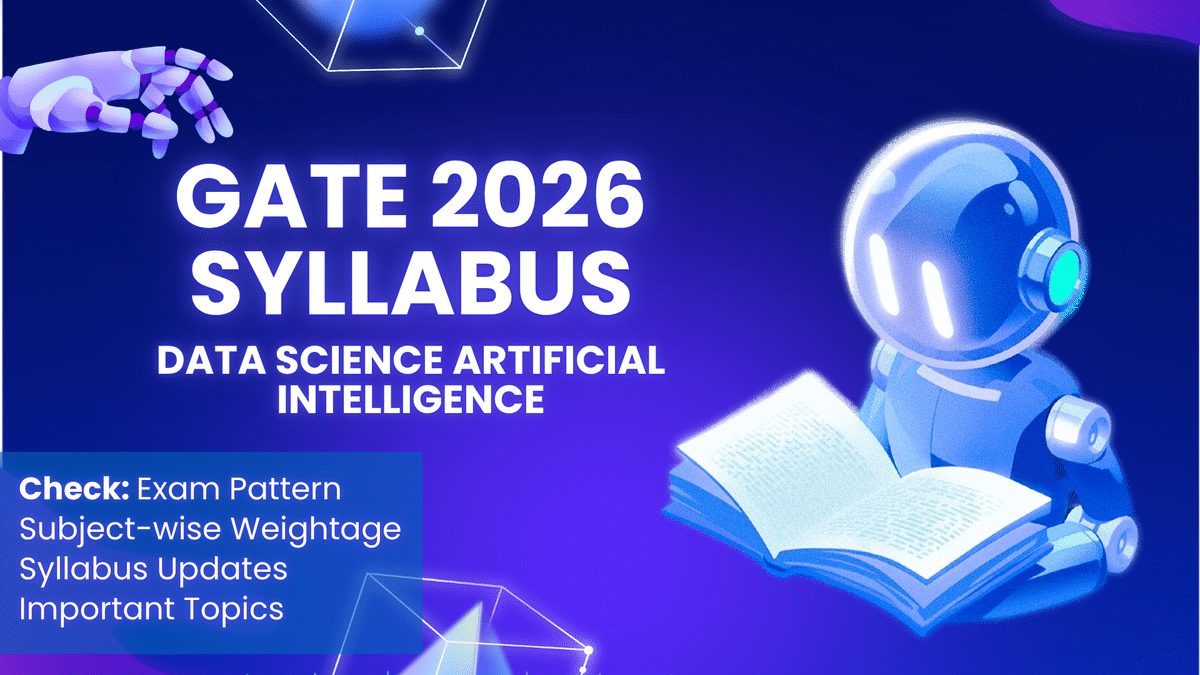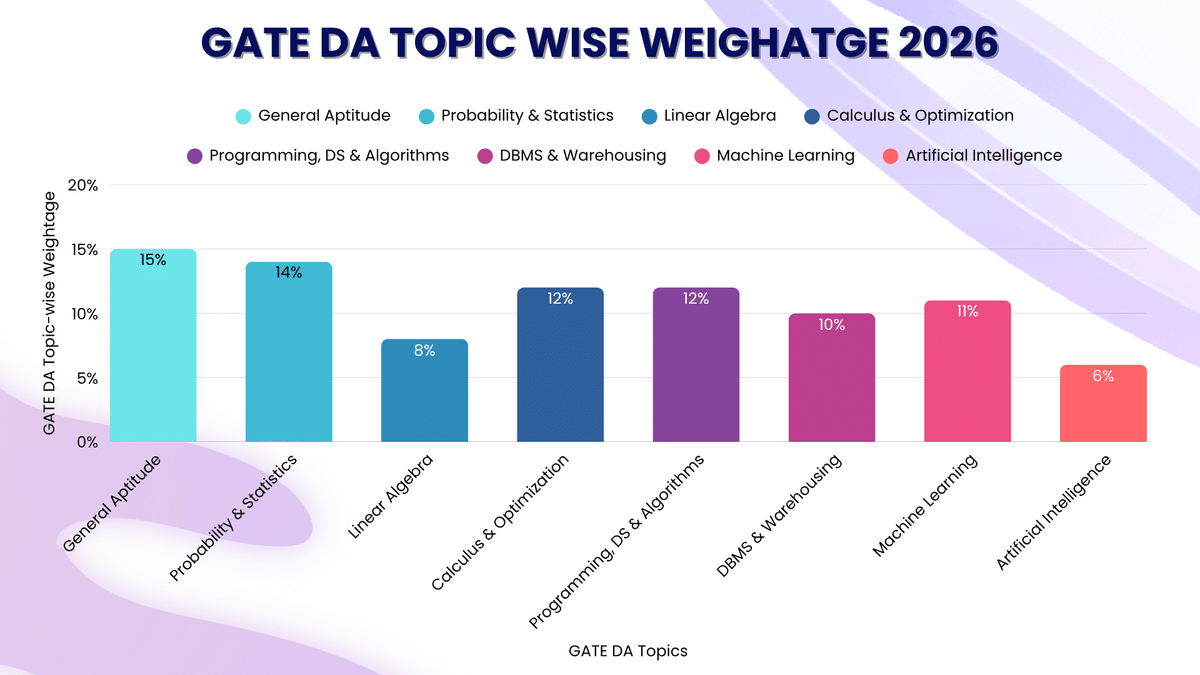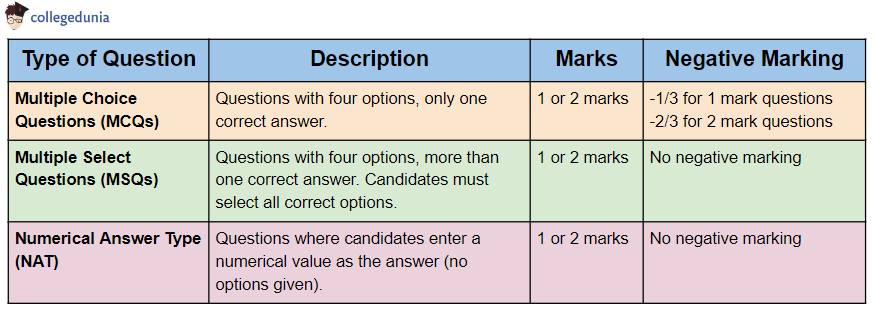IIT Guwahati has released the GATE DA Syllabus 2026 on its official website. The GATE DA syllabus 2026 is expected to remain the same as 2025. The GATE DA syllabus 2026 will have 2 sections: General Aptitude and Core Data Science and Artificial Intelligence topics
The GATE DA exam will consist of 65 questions, for a total of 100 marks, divided into a General Aptitude (GA) section (15 marks) and a Core DA section (85 marks).
- Machine Learning: ~11–14 questions with 18–22 marks (~25–30% of Core Section)
- Probability & Statistics: ~9–10 questions with 15–18 marks (~ 20–25%)
- Programming, Data Structures & Algorithms: ~10–12 questions with 13–17 marks (~15–20%)
- Linear Algebra: ~5–6 questions with 8–10 marks (~ 10–12%)
- Artificial Intelligence: ~6–7 questions with 10–12 marks (~12–14%)
- Databases & Data Warehousing: ~5–6 questions with 7–9 marks (~8–10%)
- Calculus & Optimization: ~4–5 questions with 6–8 marks (~8–9%).
Machine Learning and Probability & Statistics dominate the GATE DA Syllabus with over 50%, making them the top-scoring topics.

Key Summary
- The GATE DA Syllabus 2026 consists of 7 core sections: Probability & Statistics, Linear Algebra, Calculus & Optimization, Programming & DSA, Databases, Machine Learning, and AI. Probability & Statistics covers Distributions, Bayes’ theorem, hypothesis testing, and the Central Limit Theorem (CLT).
- Linear Algebra has Vector spaces, eigenvalues, and LU/SVD decompositions.
- Calculus & Optimization focuses on Taylor series, maxima/minima, and convexity concepts.
- Programming & DSA includes Python, recursion, graph algorithms, sorting, BFS/DFS.
- Databases consist, ER models, normalization, indexing, and schemas.
- Machine Learning includes Regression, SVM, decision trees, k-means, and PCA.
- Artificial Intelligence covers Search algorithms (A*, min-max), logic, and Bayesian inference.
- Based on the GATE DA paper analysis, each topic is expected to carry 5–15 marks in 2026.
- The total score for GATE DA is 100 marks, with 15 marks from General Aptitude and 85 from the core subjects of GATE DA in 3 hours (180 minutes) in CBT mode.
- High-weightage topics include Machine Learning (25–30%), Probability & Statistics (20–25%), and Programming & DSA (15–20%).
Also Read
- GATE Data Science and Artificial Intelligence Syllabus 2026
1.1 GATE Data Science and AI General Aptitude
1.2 GATE Data Science and AI Syllabus
1.3 Mathematics for Data Science
1.4 Programming and Data Structures
1.5 Data Handling and Analysis
- GATE AI Weightage Subject Wise
- GATE Data Science and AI Scoring
- GATE Data Science And AI Preparation Strategies
4.3 General Tips from Toppers:
GATE Data Science and Artificial Intelligence Syllabus 2026
The GATE Data Science and AI syllabus 2026 comprises two sections: General Aptitude and Data Science with the different weighatge. The General Aptitude section has 15% weightage and Data Science has 85% weightage. We will review the details of both sections separately.

GATE Data Science and AI General Aptitude Syllabus 2026
The General Aptitude section of the GATE Data Science and Artificial Intelligence Syllabus 2025 is similar to the remaining papers. It carries a weightage of 15% and includes the following topics:
| GATE 2026 DA Syllabus for General Aptitude | |
|---|---|
| Topics | Subtopics |
| Verbal Aptitude | Basic English grammar: tenses, articles, adjectives, prepositions, conjunctions, verb-noun agreement, and other parts of speech. Basic vocabulary: words, idioms, and phrases in context Reading and comprehension Narrative sequencing |
| Quantitative Aptitude | Data interpretation: data graphs (bar graphs, pie charts, and other graphs representing data),2 and 3-dimensional plots, maps, and tables. Numerical computation and estimation: ratios, percentages, powers, exponents and logarithms, permutations and combinations, and series, mensuration and geometry elementary statistics and probability |
| Analytical Aptitude | Logic: deduction and induction, analogy, numerical relations and reasoning |
| Spatial Aptitude | Transformation of shapes: translation, rotation, scaling, mirroring, assembling, grouping, Paper folding, cutting, and patterns in 2 and 3 dimensions |
GATE Data Science and AI Syllabus
The GATE Data Science and AI syllabus covers several core topics, balancing foundational knowledge with advanced concepts. The GATE Data Science and Artificial Intelligence subjects cover a range of topics that are important for understanding and excelling in the field. Some of the key GATE Data Science and Artificial Intelligence subjects included in the syllabus are:
- Probability and Statistics
- Linear Algebra
- Calculus and Optimization
- Programming, Data Structures, and Algorithms
- Database Management and Warehousing
- Machine Learning
- AI (Artificial Intelligence)
Mathematics for Data Science
- Linear Algebra: Vectors, matrices, eigenvalues, and eigenvectors.
- Calculus: Differentiation, integration, and optimization techniques.
- Probability and Statistics: Random variables, probability distributions, hypothesis testing, and statistical inference.
Programming and Data Structures
- Programming Languages: Proficiency in Python and R is essential.
- Data Structures: Understanding arrays, linked lists, trees, graphs, and hash tables.
- Algorithms: Familiarity with sorting, searching, and basic algorithm design.
Data Handling and Analysis
- Data Preprocessing: Techniques for cleaning, transforming, and manipulating data.
- Exploratory Data Analysis (EDA): Methods for summarizing and visualizing data.
- Data Visualization: Utilizing libraries (e.g., Matplotlib, Seaborn) and tools (e.g., Tableau) for effective visualization.
Machine Learning and AI
- Supervised Learning: Regression, classification, decision trees, and support vector machines (SVM).
- Unsupervised Learning: Clustering techniques, dimensionality reduction, and association rules.
- Deep Learning: Understanding neural networks, convolutional neural networks (CNNs), recurrent neural networks (RNNs), and transfer learning.
- Model Evaluation: Techniques for cross-validation and metrics (accuracy, precision, recall, F1 Score).
Big Data Technologies
- Introduction to Big Data: Concepts, challenges, and popular tools.
- Frameworks: Understanding Hadoop, Spark, and distributed computing.
- NoSQL Databases: Key Value stores, document stores, and graph databases.
Ethics and Responsible AI
- Ethical Considerations: Addressing bias in AI, data privacy, and security issues.
- Regulatory Frameworks: Familiarity with data protection laws and guidelines.
We have provided a table below with the details of all the subjects included in the GATE Data Science and Artificial Intelligence syllabus.
| Topics | Details |
|---|---|
| Probability and Statistics | Counting (permutation and combinations), probability axioms, Sample space, events, independent events, mutually exclusive events, marginal, conditional, and joint probability, Bayes Theorem, conditional expectation and variance, mean, median, mode and standard deviation, correlation, and covariance, random variables, discrete random variables and probability mass functions, uniform, Bernoulli |
| Linear Algebra | Vector space, subspaces, linear dependence and independence of vectors, matrices, projection matrix, orthogonal matrix, idempotent matrix, partition matrix, and their properties, quadratic forms, systems of linear equations and solutions; Gaussian elimination, eigenvalues, and eigenvectors, determinant, rank, nullity, projections, LU decomposition, singular value decomposition. |
| Calculus and Optimization | Functions of a single variable, limit, continuity, and differentiability, Taylor series, maxima and minima, optimization involving a single variable. |
| Programming, Data Structures and Algorithms | Programming in Python, basic data structures: stacks, queues, linked lists, trees, hash tables; Search algorithms: linear search and binary search, basic sorting algorithms: selection sort, bubble sort, and insertion sort; divide and conquer: merge sort, quick sort; introduction to graph theory; basic graph algorithms: traversals and shortest path. |
| Database Management and Warehousing | ERmodel, relational model: relational algebra, tuple calculus, SQL, integrity constraints, normal form, file organization, indexing, data types, data transformation such as normalization, discretization, sampling, compression; data warehouse modeling: schema for multidimensional data models, concept hierarchies, measures: categorization and computations. |
| Machine Learning | (i) Supervised Learning: regression and classification problems, simple linear regression, multiple linear regression, ridge regression, logistic regression, nearest neighbor, naive Bayes classifier, linear discriminant analysis, support vector machine, decision trees, bias-variance tradeoff, cross-validation methods such as leave out (LOO) cross-validation, k folds cross-validation, multilayer perceptron, feedforward neural network; (ii) Unsupervised Learning: clustering algorithms, k means/k medoid, hierarchical clustering, top-down, bottom-up: single linkage, multiple linkage, dimensionality reduction, principal component analysis. |
| AI | Search: informed, uninformed, adversarial; logic, propositional, predicate; reasoning under uncertainty topics conditional independence representation, exact inference through variable elimination, and approximate inference through sampling. |
Also Read
GATE DA Topic-wise Weightage 2026
The GATE DA 22026 topic-wise weightage shows that the General Aptitude will have 15% of weight, and the core topics of GATE DA include:
- Probability & Statistics (14%) and Machine Learning (11%), are the top-scoring and important topics.
- The Programming & DSA and Calculus & Optimization will have the weightage of 12% each, including algorithmic and analytical reasoning.
- The Linear Algebra and DBMS, and Artificial Intelligence will have the weighatge of 8%, 10%, and 6%, respectively.
| Subject | Key Topics | Estimated Marks % |
| General Aptitude | Verbal, quantitative, logical, spatial reasoning | 15% |
| Probability & Statistics | Distributions, CLT, expectation, testing | 14% |
| Linear Algebra | Vectors, matrices, eigen decomposition | 8% |
| Calculus & Optimization | Limits, maxima/minima, Taylor series | 12% |
| Programming, DS & Algorithms | Python, DS, sorting/search, graph algorithms | 12% |
| DBMS & Warehousing | SQL, ER models, normalization, schema design | 10% |
| Machine Learning | Regression, classification, clustering, networks | 11% |
| Artificial Intelligence (AI) | Search, logic, reasoning, adversarial algorithms | 6% |

GATE AI Weightage Subject-wise
You will receive different questions in the GATE exam. Preparing for GATE is very important for your success. The types and number of questions vary and their weightage are:
| Chapter/Topic | Weightage (%) |
|---|---|
| Mathematics for Data Science | 20% |
| Linear Algebra | 5% |
| Calculus | 5% |
| Probability and Statistics | 10% |
| Programming and Data Structures | 15% |
| Python Programming Constructs | 5% |
| Data Structures | 5% |
| Algorithm Complexity Analysis | 5% |
| Data Handling and Analysis | 15% |
| Data Preprocessing | 5% |
| Exploratory Data Analysis (EDA) | 5% |
| Data Visualization | 5% |
| Machine Learning and AI | 30% |
| Supervised Learning | 10% |
| Unsupervised Learning | 5% |
| Deep Learning | 10% |
| Model Evaluation | 5% |
| Big Data Technologies | 10% |
| Hadoop Ecosystem | 5% |
| NoSQL Databases | 5% |
| Ethics and Responsible AI | 5% |
| Interdisciplinary Applications | 5% |
| NLP | 3% |
| Computer Vision | 2% |
Also Read
Check some GATE Previous Question Papers:
| Exam Year | GATE Previous Year Question Papers with Solutions |
|---|---|
| GATE 2025 | Download Question Paper |
| GATE 2024 | Download Question Paper |
| GATE 2023 | Download Question Paper |
| GATE 2022 | Download Question Paper |
| GATE 2021 | Download Question Paper |
| GATE 2020 | Download Question Paper |
GATE DA Important Topics 2026
As per the previous years' GATE DA paper analysis shows that the topics like Regression, Clustering, PCA/Eigenvalues, and AI are the most scoring topics with covering at least 35-40% of the core marks.
- Regression was the most occurring topic, with the ~11–13 marks, focusing on topics like slope, Ridge, and accuracy.
- From the Clustering topic, 1–2 questions are expected with ~5–6 marks, whereas Eigenvalues & PCA will have around 3–4 questions with ~13–15 marks, including ML and Linear Algebra with frequent NAT/MSQ appearances.
- AI is expected to have less weighatge of 5–7 marks with 2–3 questions in GATE DA 2026.
| Topic | 2025 Weightage(Actual) | 2026 Weightage(Expected) | Why It Matters |
| Regression (Linear/Logistic) | ~12–14 marks(3–4 Qs) | ~11–13 marks(3–4 Qs) | Core supervised ML concept; frequently tested with slope calculation, regularization (Ridge), and classification accuracy. High accuracy potential with basic algebra. |
| Clustering (K-means, Hierarchical) | ~4–5 marks(1–2 Qs) | ~5–6 marks(1–2 Qs) | Unsupervised ML section; easy-to-score, low computation. Repeated questions on K-means iteration or cluster linkage logic. |
| Eigenvalues & PCA (Linear Algebra) | ~15–17 marks(3–5 Qs) | ~13–15 marks(3–4 Qs) | Fundamental to both Linear Algebra and ML. Appears in PCA, SVD, matrix definiteness, projections. Often tested with NAT/MSQ on trace, rank, and variance. |
| Artificial Intelligence (AI) | 3 marks(1 MCQ + 1 NAT) | 5–7 marks(2–3 Qs) | Growing area in GATE DA. Involves logic, A*/Greedy search, Bayesian inference — conceptual but quick-to-solve if well-prepared. Bonus marks for low effort. |
GATE Data Science and AI Scoring
The GATE Data Science and AI exam includes multiple choice questions (MCQs), multiple select questions (MSQs), and numerical answer type questions (NATs). The questions will have 1 or 2 marks each. You will also have negative marks for incorrect answers.

Also Read
GATE Data Science And AI Preparation Strategies
To excel in the GATE Data Science and AI examination, candidates can follow these strategies:
- Study Resources: Utilize textbooks, online courses, and tutorial videos that comprehensively cover the syllabus.
- Mock Tests: Practice with mock exams to familiarize yourself with the exam format and improve time management.
- Group Study: Collaborating with peers can enhance understanding and provide diverse perspectives on complex topics.
Here’s the revised study plan for the GATE Data Science and AI exam, including suggested study times for both 6-month and 3-month preparations in a tabular format:
6-Month Study Plan
| Month | Focus Areas | Study Plan | Time | Tips from Toppers |
|---|---|---|---|---|
| 1 | Mathematics, Programming, Data Structures | Week 1 and 2: Linear Algebra and Calculus review. Week 3 and 4: Probability and Statistics exercises. Revise Python and R basics. | 23 hours/day | Create flashcards for formulas; join online forums for doubt clearance. |
| 2 | Data Handling and Analysis | Week 1 and 2: Learn data cleaning techniques. Week 3: Perform EDA on datasets. Week 4: Data visualization with Matplotlib and Seaborn. | 23 hours/day | Use Kaggle datasets for practical experience; document projects. |
| 3 | Machine Learning and AI | Week 1: Supervised Learning (Regression, SVM). Week 2: Unsupervised Learning (Clustering, PCA). Week 3: Deep Learning concepts. | 34 hours/day | Create a cheat sheet for algorithms; engage in study groups. |
| 4 | Big Data Technologies and Ethics | Week 1: Basics of Hadoop and Ecosystem. Week 2: Study Spark and distributed computing. Week 3: Data privacy and ethical AI practices. | 23 hours/day | Watch online tutorials; read case studies on ethical issues. |
| 5 | Revision and Mock Tests | Week 1: Revise Mathematics and Programming. Week 2: Revise Data Handling and ML concepts. Week 3: Take full-length mock tests. | 34 hours/day | Simulate exam conditions during mocks; practice time management. |
| 6 | Final Revision | Week 1: Final revisions of weak areas. Week 2: Focus on all topics, mock tests, and analyze performance. | 23 hours/day | Prioritize revision based on test results; stay calm and focused. |
3-Month Study Plan
| Month | Focus Areas | Study Plan | Time Commitment | Tips from Toppers |
|---|---|---|---|---|
| 1 | Mathematics, Programming, Data Structures | Week 1: Cover Linear Algebra and Probability. Week 2: Focus on Calculus and Statistics. Week 3: Revise Python and data structures. | 34 hours/day | Daily problem solving; utilize online coding platforms for practice. |
| 2 | Core Data Science Topics | Week 1: Learn data preprocessing techniques. Week 2: Focus on EDA and visualization. Week 3: Dive into supervised learning. | 34 hours/day | Create summary notes for algorithms; engage in online discussions. |
| 3 | Revision, Mock Tests, Final Touches | Week 1: Revise all mathematics topics. Week 2: Review data science and ML concepts. Week 3: Take multiple mock tests. | 45 hours/day | Prioritize revision based on mock results; manage exam stress. |
General Tips from Toppers:
- Consistency: Stick to your study schedule.
- Practice: Solve previous years' papers regularly.
- Resources: Use a variety of study materials (textbooks, online courses).
- Discussion: Engage with peers or online forums for doubts.
- Health: Maintain a balanced diet and take regular breaks.
This structured approach with time commitments will help candidates prepare effectively for the GATE Data Science and AI exam.
GATE DA Syllabus 2026 FAQs
Ques. Is GATE DA easy?
Ans. The GATE DA is not easy, but the candidate can score with the right educational background and preparation strategy, and 42–50 questions is considered a good attempt.
In GATE 2024, around 30-35% of candidates scored more than 40 marks, which reflects the moderate difficulty level of the GATE DA exam.
The Topics like PCA, Regression, and Bayesian inference are expected to repeat frequently, which provides a high ROI with focused preparation.
| Aspect | Difficulty Level | Notes |
| Math-heavy content | Moderate to Tough | Linear algebra, probability, statistics, and optimization are core. |
| Programming (Python) | Easy to Moderate | Basic DSA and syntax-based questions, no deep algorithms. |
| ML & AI concepts | Moderate | More applied than theoretical; requires conceptual clarity. |
| General Aptitude | Easy | Similar to other GATE papers, 15-mark section. |
| Paper Pattern | Predictable | Mostly MCQ, NAT, MSQ — concept-based with less coding. |
Ques. Which topics offer the highest ROI?
Ans. Probability & Statistics + Machine Learning combined account for ~30–32% of the core marks, get these down as first choices.
- Linear Algebra (~12%) is theoretically rich but tends to be formulaic.
- Programming & Data Structures (~25%) provide reliable marks with concerted effort.
- AI (~13%) questions are now more trendy, challenging search reasoning or probabilistic inference and tending to have low time-per-mark cost.
Ques. What is GATE DA, and who conducts the exam?
Ans. The GATE DA (Data Science and Artificial Intelligence) is a GATE paper introduced in 2024 (conducted by IISc Bengaluru), and in 2025 by IIT Roorkee, and GATE 2026 will be conducted by IIT Guwahati. Around 75,800 candidates registered for the exam, with approximately 57,000 attending, and only 15-20% candidates qualify, making it the most competitive exam.







Comments